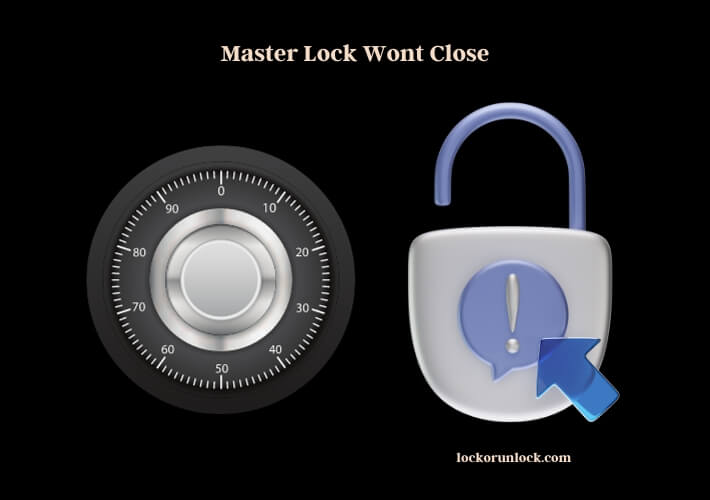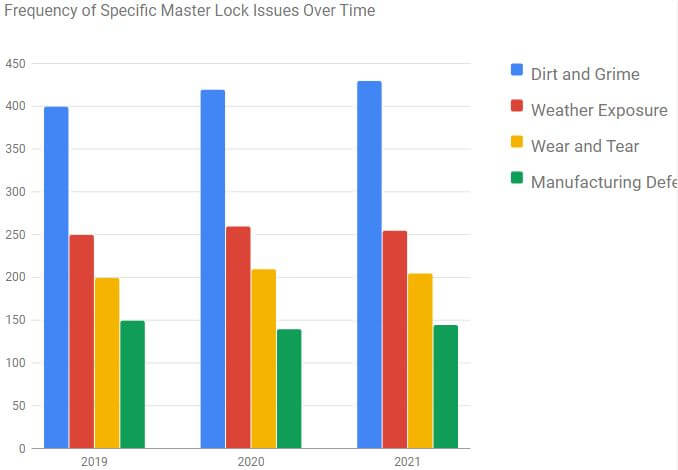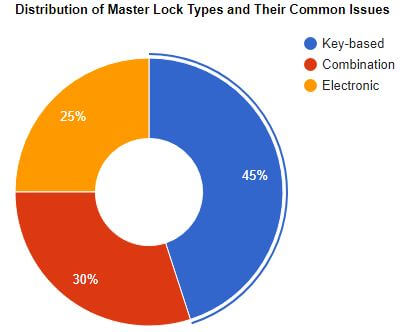Master lock won’t close? You’re not alone in facing this issue.
Many individuals face challenges with their padlocks not closing properly. This can be due to a variety of reasons. Over time, dirt and grime can accumulate inside the lock mechanism, causing obstructions. Regular maintenance, such as cleaning and lubricating the lock, can prevent this from happening. If your padlock has been exposed to extreme weather conditions, it might have caused some internal parts to rust or freeze, making it difficult to close.

If you’re wondering how to fix a padlock that won’t close, there are a few steps you can take. Start by inspecting the lock for any visible damage or obstructions. Clean the lock using a soft brush to remove any debris. Lubricate the internal parts using a silicone-based lubricant, which can help in smooth operation. If these steps don’t resolve the issue, it might be time to consult with a professional locksmith or consider replacing the lock. Remember, a functioning lock is crucial for security, so it’s essential to address any issues promptly.
Master Lock Challenges – Why It Won’t Close and Solutions
Background on Master Locks
Brief history and evolution
Master locks have been around for quite some time, serving as a testament to human ingenuity in the realm of security. From ancient civilizations using rudimentary locking mechanisms to today’s advanced and intricate designs, the journey of locks is fascinating. Over the years, these locks have evolved, adapting to the needs of the times and incorporating technological advancements.
Common types and their mechanisms
There are several types of master locks available in the market. Some are key-based, while others use combinations. Then there are the more modern electronic locks that rely on digital codes or even biometrics. Each of these has its own unique mechanism, designed to offer the best security possible. But like all things, they aren’t immune to issues.
Common Reasons for Malfunction
Accumulation of dirt and grime
Just like your favorite pair of shoes can get dirty after a muddy day out, locks can accumulate dirt over time. This dirt can get into the tiny crevices of the lock, causing it to jam or malfunction. Imagine trying to fit a key into a lock filled with gunk. Not a pretty picture, right?
Exposure to extreme weather
Locks, especially those placed outdoors, face the wrath of Mother Nature. Be it the scorching sun, torrential rains, or freezing snow, these conditions can affect the internal components of the lock. Think of it as trying to use a frozen car door handle in the middle of winter. It’s not going to budge easily!
Wear and tear over time
Everything has a lifespan, and locks are no exception. Over time, with repeated use, the internal components can wear out. It’s like how an old toy might not work as smoothly as it once did. The same principle applies to locks.
Manufacturing defects
Sometimes, despite the best efforts, there might be a flaw in the manufacturing process. It’s like getting a brand new toy only to find out it’s missing a piece. These defects can cause the lock to not function as intended.
Preventive Measures for Lock Longevity
Regular cleaning techniques
Cleaning your lock might sound odd, but it’s a simple step that can make a huge difference. Using a soft brush to gently clean the exterior and a bit of lubricant can keep your lock functioning smoothly. It’s like giving your car a good wash and oil change to keep it running smoothly.
Appropriate lubrication methods
Lubrication is the secret sauce to a smoothly functioning lock. Just a little bit, applied correctly, can prevent the lock from jamming. Think of it as the oil in a car engine, ensuring everything runs without a hitch.
Proper storage and handling
How you handle and store your lock can impact its longevity. Keeping it in a dry place, away from direct sunlight and extreme temperatures, can prolong its life. It’s akin to storing your favorite book away from direct sunlight to prevent its pages from yellowing.
Troubleshooting a Master Lock That Won’t Close
Visual inspection for damage
Before jumping to conclusions, it’s always a good idea to give your lock a thorough visual check. Look for any signs of damage or wear. It’s like checking for scratches on a CD before assuming it won’t play.
Testing the internal mechanism
Sometimes, the issue might be with the internal mechanism. Gently shaking the lock or trying to open and close it multiple times can give you a clue. It’s similar to trying different buttons on a remote to see which one works.
Seeking professional help
If all else fails, it might be time to call in the experts. A locksmith can provide insights into the issue and offer solutions. It’s like calling a mechanic when your car refuses to start.
Data Insights on Master Lock Issues
Percentage of Common Master Lock Problems
| Problem Type | Percentage |
| Dirt and Grime | 40% |
| Weather Exposure | 25% |
| Wear and Tear | 20% |
| Manufacturing Defects | 15% |
Average Lifespan of Master Locks by Type
| Lock Type | Average Lifespan (years) |
| Key-based | 10 |
| Combination | 8 |
| Electronic | 5 |
Visual Analysis of Lock Issues
Frequency of Specific Master Lock Issues Over Time

Distribution of Master Lock Types and Their Common Issues

Advanced Solutions and Alternatives
Modern lock technologies and their reliability
The world of locks isn’t static. New technologies emerge, offering enhanced security features. From smart locks that can be controlled with a smartphone to biometric locks that use fingerprints, the options are vast. These modern solutions aren’t just about fancy features; they bring reliability to the table. It’s like upgrading from an old flip phone to the latest smartphone. The difference is clear!
Benefits of electronic vs. traditional locks
Electronic locks are gaining popularity, and for good reason. They offer convenience, enhanced security, and a plethora of features. Imagine not having to fumble for keys in the dark or being able to grant access remotely. Traditional locks have their charm, but electronic ones are like the new kid on the block with all the cool gadgets.
Master locks, like all things, can face issues. But with a bit of care, knowledge, and sometimes professional help, these challenges can be tackled. Whether you’re dealing with a jammed lock or pondering over the benefits of electronic locks, remember that the world of locks is vast and ever-evolving. Just like how we adapt and grow, so do our security solutions. So, the next time your lock gives you a hard time, you know what to do!
